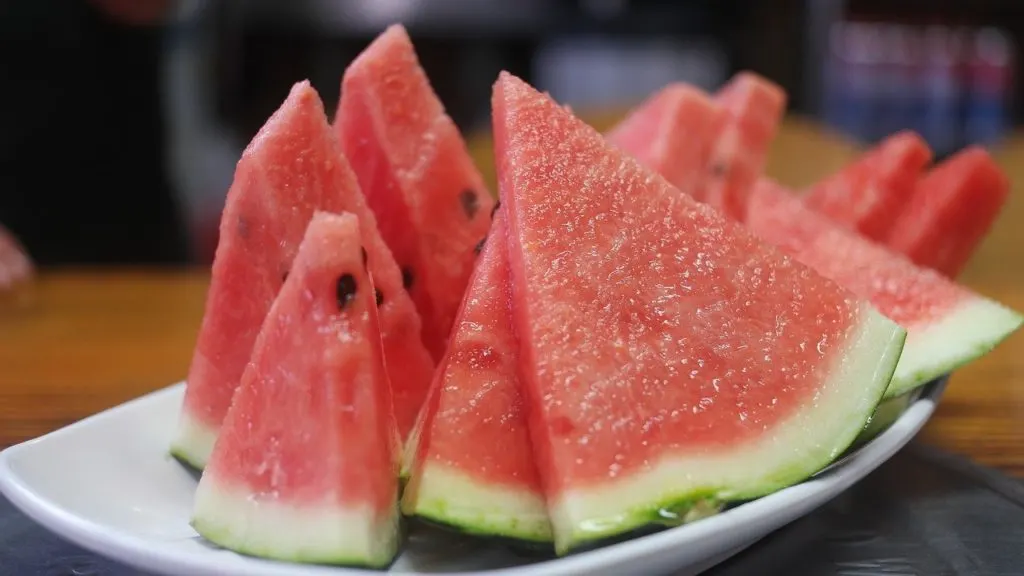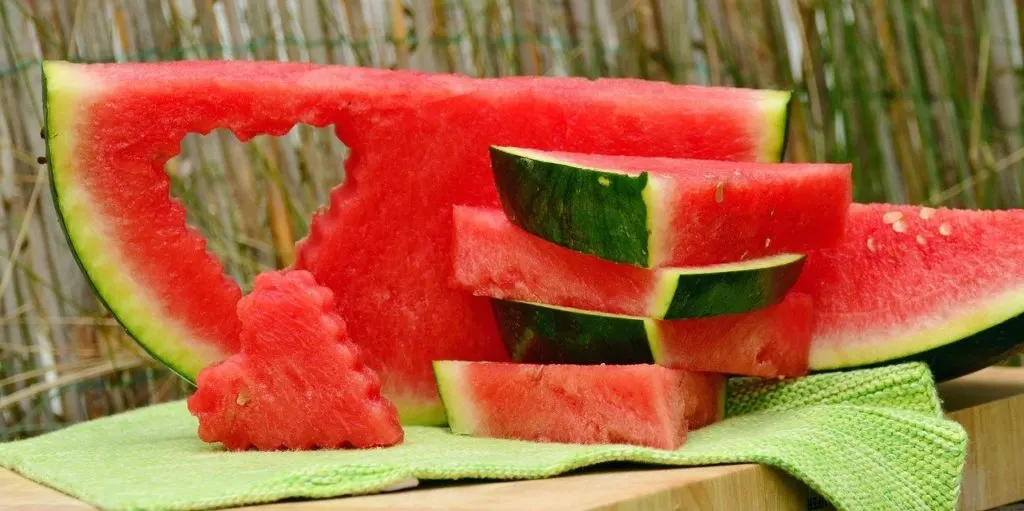Many people can’t fathom summer without a wonderful, sweet, and juicy watermelon in their hands. For us dog owners, it is a joy to share our favorite foods and fruits with our four-legged companions. We also know that our four-legged fur babies can eat a variety of fruits. For example apples and blueberries, but there are also other fruits that they should not eat because they are harmful. For example grapes, it´s the ultimate fruit they should avoid. On the other hand, where do watermelons fit into this picture? Is it safe for dogs to eat watermelon?
The watermelon can help you and your dog remain hydrated throughout the hot summer months. It’s made up of around 90% water. Antioxidants, such as those found in watermelon, help to eliminate free radicals and reactive species from the body. When the body goes through typical processes, such as digestion, it produces free radicals. They may also be triggered by environmental factors such as air pollution, stress, and other factors.
Here, we will explore if watermelon has any health advantages for dogs. And also whether or not watermelon is safe for dogs to consume.
Read some of our other articles:
- Brindle Pitbull Dog: Everything That You Should Know
- Cane Corso Blue: The Rare And Mystery Cane Corso
- Onofrio Dog Shows: Everything That You Should Know
- Cane Corso Dogo Argentino Mix
- Doberman Pitbull Mix: Best Of Both Worlds?
- Bordoodle: The Intelligent And Energetic Doodle
- Should I Wake Up My Puppy To Pee At Night?
- Lycan Shepherd: A mix of three breeds
- Tibetan Mastiff: A Protective & Fearless Giant
Can dogs eat watermelon?
Given that you’re reading this article, you’re probably wondering if a watermelon is safe for dogs, can dogs eat it without any effects? The simple answer is that it is! It is possible for dogs to consume watermelon and it can be a healthy snack, but you need to take certain precautions.
There are many nutrients in watermelon, which makes it a superfood that is good for you. It has a lot of potassium and vitamin A, which are good for your eyes, cells, and immune system. It also has a lot of calories. Vitamin B6 is also in the product, which helps keep your dog’s coat bright and strong. Having a lot of vitamin C makes watermelons a great way to fight off allergies and sniffles. All of these things are good for both people and dogs.

Another amazing thing about watermelons is that they are high in the antioxidant lycopene! Natural red fruits and vegetables contain this phytochemical, you can actually find it in high concentrations in them. It is beneficial since it is a powerful antioxidant! Lycopene is a powerful antioxidant that fights free radicals in your dog’s system (and your system too). A major reason why this antioxidant is so essential is that these free radicals have the potential to harm your dog’s cells and cause problems with their immune system.
Watermelon is also low in calories and very hydrating (since it is mostly composed of water), which makes it a delicious and refreshing treat on a hot summer day.
All health benefits of watermelon
We have already said that watermelon is high in antioxidants, potassium, and the vitamins C, B6, and A, among other nutrients. It also contains a lot of Lycopene and has a lot of fiber. Watermelon is considered a superfood even though watermelon is composed 92 percent of water. And in addition to that, it is an excellent option for hydration on a hot day.
But, let’s look at all the health advantages of watermelon in more detail:
- Moisture: Hydration is enhanced by a high moisture content (94 percent water and it doesn´t contain much sugar), which is particularly helpful in hot weather conditions.
- Antioxidants: They help to repair cells that have been harmed by the environmental pressures that we, and our pets, have endured. Consider them to be oxidation troops on the lookout for damaged cells and rescuing them from the deterioration that causes our dogs’ bodies to break down as they age.
- Lycopene: When it comes to watermelon and tomatoes, lycopene is the pigment that gives them their vibrant color. It is also effective in the prevention of cancer and the enhancement of canine eyesight. According to research, it may also help to halt the progression of cancer.
- Potassium: Essential for good kidney and heart function, as well as for maintaining healthy bone density, regulating fluid levels, and assisting in muscle growth.
- Vitamin C: Another potent antioxidant that also helps to improve the immune system and decrease inflammation.
- High fiber: To prevent constipation, fiber helps to treat diarrhea, and prevents blockages in the intestinal system by keeping food circulating through the digestive tract. Watermelon is very high in fiber content.
- Vitamin A: Helps to maintain the appropriate function and appearance of the skin, coat, muscles, and nerves.
- Vitamin B6: A coenzyme that is essential for the proper functioning of the brain and body, including the regulation of fluid balance, the formation of proteins, the regulation of hormones, and the support of neurotransmitters in your dog’s body.
Safe serving – How much watermelon can a dog eat?
It is safe and good for your dog to eat watermelon! You must, however, make certain that the seeds and rind are removed before feeding watermelon to your dog!
This is essential since your dog should not be ingesting watermelon seeds at any point in his life! They are very harmful since they have the potential to induce intestinal obstruction.
As a result, be certain that they are removed before feeding them to your dog. Also, don’t forget the rind. It has the potential to induce gastrointestinal discomfort and also creates a choking danger.
In certain cases, too much of a good thing may be detrimental. Even though watermelons have nearly no calories and are mostly composed of water, it is not suggested that you feed your dog an excessive amount.
Your dog has probably never eaten watermelon before, and like with any new food that you introduce to them, it’s best to start with a modest amount at first. Start with two or three little pieces at a time and pay close attention to how your dog responds. Because every dog is unique, we are unable to provide you with a precise figure for how much you should feed your dog.
Diarrhea is a sure indicator that your dog has consumed an excessive amount of a certain meal. Consequently, if your dog has diarrhea every time you give them watermelon, you should stop feeding them.
How to feed your dog watermelon
Dogs may safely consume the juicy, flesh part of the watermelon, but they should avoid other parts of the fruit. While the skin or rind of a watermelon and seeds of watermelons are not harmful, they are difficult to chew and digest, and as a result, they might pose a hazard to your pup’s teeth and digestive system.
There’s no need to worry about a few seeds. But, if your dog eats many of them at once, it could cause bowel obstruction and other problems, but a few seeds won’t do much.
The rind of the watermelon is also not good to eat. This solid object can get stuck in your dog’s intestines or hurt his teeth because it is so hard. If your dog has dental or gum problems, they may hurt or lose their teeth if they try to chew on the rind of the fruit.
Keep an eye on your animal friend for signs of a blocked digestive tract for the first 24 hours after he or she has eaten the seeds or rind. As soon as you notice any signs of gastrointestinal discomfort, constipation, or vomiting, take your pet to the veterinarian as soon as possible to avoid more problems.
Fresh watermelon
Giving a healthy dog small chunks of fresh watermelon is the quickest and most convenient alternative! It is also the safest option and the best way to give your dog watermelon. You need to clean the watermelon very well and serve it without rinds. Also, slice it into tiny pieces after you remove the seeds and skin.
You may store the watermelon in your refrigerator and offer it to your dog as a treat throughout the day. Fresh or unsweetened frozen, natural watermelon are the only options for your dog. Watermelon that has been canned, sugared, or packaged in syrup should not be fed to them. The amount of sugar in these meals is excessive, and they may also include preservatives and artificial sweeteners such as xylitol, which are toxic to dogs. Also, avoid any sweet products that are watermelon flavored, it´s needless to say that they are not safe for dogs.

But remember, watermelon should not constitute a significant portion of your dog’s diet. A considerable quantity of watermelon consumed by your pet may result in stomach pain, diarrhea, and other signs of gastrointestinal discomfort.
Many animals have stomach discomfort whenever they try a new meal, so it’s a good idea to start with little portions of watermelon and observe how your furry friend responds. As is usually the case, it’s better to consult with your veterinarian about the right quantity of watermelon to give your dog instead of your dog having an upset stomach.
Frozen watermelon
Even though dogs like ice cubes, they aren’t the best thing to give your dog. To avoid them at all costs, you should not let your dog eat them. They could break or fracture his teeth. This is not the case with watermelon, which has a texture that is soft and almost powdery on the inside. If you freeze the food, you can be sure that it won’t hurt your dog’s teeth and it’s a tasty treat.
You can also make your dog a watermelon slushy or a pup-sicle by adding other healthy ingredients. So, if you’re feeling very creative and want to do something special for him or her, here are some recipes to help you out.
Watermelon Pup-sickle
For this watermelon pup-sickle you will only need three ingredients: watermelon, low-fat yogurt, and honey.
You can find a lot of vitamins and nutrients in watermelon, which is good for dogs. Another thing: It also has a lot of fiber, is not fat-free and has a low amount of calories and salt in it. Because watermelon is 92% water content, it could be a great way to stay hydrated on hot days. It is also very tasty when raw or chilled. You should not give your dog watermelon seeds, the rind, or the peel because they are hard for him to break down. In addition, don’t buy watermelon products that have artificial sweeteners in them. Obviously, they are high in sugar and other things that are bad for you and your dog.
There are a lot of benefits to giving our dogs plain, low-fat, or nonfat yogurt. It helps them digest, and it’s also a good source of calcium for them. Do not give your dog yogurt that has a lot of sugar or one that has the chemical xylitol in it, which is bad for them.
Honey is safe for dogs when they eat small amounts of it. Some people think it can also help with seasonal allergies and kennel cough, but this hasn’t been proven in clinical trials. If you give raw honey to puppies, dogs with weak immune systems, overweight dogs, or diabetic dogs, you could give them botulism spores. This is why you should not give raw honey to these types of dogs.
To make these, but all of the ingredients in a blender and blend them until smooth. Then, put them in a mold and freeze for a few hours!
Conclusion – Can dogs eat watermelon?
As a last note, watermelons are a delicious and nutritious snack option for your canine companion. And they are a great treat choice. This fruit contains plenty of vitamins, is a source of lycopene, is high in fiber, and has very high water content. But be certain that you prepare it properly, so no rinds or seeds.
Also, keep in mind that you should not overfeed your dog. No matter if you have a smaller breed or large dogs, figuring out the appropriate amount is important. Sadly, we can´t tell you how much watermelon your dog can eat. It all varies from individual dog to individual dog.
If you´re still wondering is watermelon bad for dogs, rest assured it is not. But there is something you should keep in mind. Watermelon might be a healthier choice than some other treats and a good source of hydration. But too much of it can be bad too! Watermelon and fruit in general should not make up a large part of a dog´s diet. According to many sources, including the American Kennel Club, if your dog eats too much watermelon they can experience abdominal pain. Other medical conditions are possible too.
Lastly, watermelon is an easy treat for all dogs. And there are so many creative ways to feed your dog watermelon. There are a number of wonderful recipes and methods for providing your dog with watermelon as a healthy refresher this summer. For example, you can feed dogs frozen watermelon, in form of pup-sickles. You can also serve it in a delicious fruit salad, or by just giving them small pieces of watermelon. Either way it´s a juicy treat!

